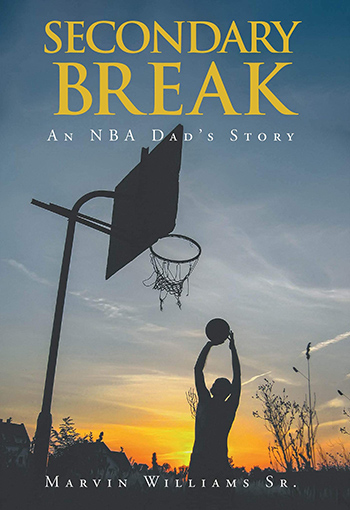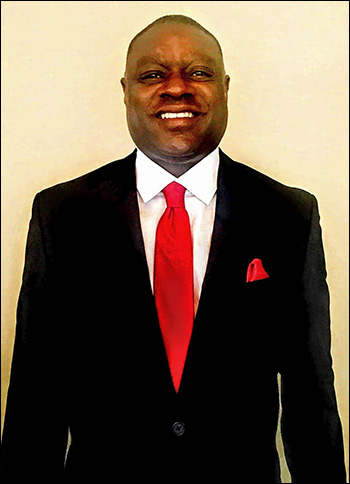

















|

Navigating Through Life's Hoops:
Interview with Marvin Williams
By Carin Chea
When life gave him lemons, Marvin Williams Sr. played basketball, got really, really good at it, and changed the course of his life.
A professional basketball coach turned writer; Williams leaves no stone unturned as he examines how his perilous beginnings transformed into nothing short of a triumph.
The father of professional NBA player Marvin Williams Jr., Williams strives to inspire and inject hope in his autobiography, Secondary Break: An NBA Dad's Story.
During this era punctuated by undeniable hopelessness, Williams' book should be a welcomed relief to us all.

You became a professional basketball coach after serving in the Navy. How did the transition to author come about?
I took a look at my life. I started writing in a journal for an hour a day, and it ended up being quite lengthy. I took it to one of my friends who's a publisher; she said I should turn it into the book. It took me about a year to get it through the editing process.
Is Secondary Break your first book? What inspired you to write this?
Yes. I was doing a self-reflection on my life as a kid. My parents were dysfunctional and violent. I had to deal with that as a child, getting injured whenever they would fight.
I was born in New York. My parents moved me down in North Carolina in 1972 where there was a lot of racism going on. The whites stuck with the whites, and black people stuck to black people.
When I was 13 or 14, I would spend 16 or 17 hours in the tobacco fields. We'd get up at 5 am and it'd be like that 6 days a week.
The good thing was, one of my friends taught me how to play basketball and I used that as an outlet. I played at the courts to escape and played with my friends. I started playing basketball, with Kenny Gaskins and that's when I met Larry Jordan and Michael Jordan.
Tell us about your book.
It's about my life. I talk about growing up in New York and the things I went through. They had the civil rights movement going on real heavy. We had community group leaders like the Black Panthers who were our spokespeople.
They get a bad rap, but the black people who grew up under them understood what they did for them. They started the Free Lunch Program. Every day at lunch time they had free bags of food. They made sure you got to eat while you were out of school for the summer.
A lot of kids out there never got to eat. For some of them, that was the only time they got to eat. I talk about some of these friends.
One of my friends Tony, his uncle was a gang member and his mother had passed away. My dad went over to his place and check on Tony, and he found he only had dog food in his cupboards - but the thing is, he didn't have a dog.
I also talk about an incident where a white lady told an [11-year-old] black kid he could clean her basement for her. But, she forgot she told him that and when she heard the noise down there, she called the police.
When the police came and saw him down there with a broom, they shot him because they thought he was robbing the place. The lady felt so guilty that she turned herself in.
There were riots - big time riots - about this incident for a few weeks, too. We couldn't even go from the corner market to our home if my dad didn't go out with us with a gun because they were flipping over buses and burning stuff down. Just like the riots we have these days.
There seems to be a lot of parallel between what you experienced in your younger life and our social justice climate now.
Yes. Unfortunately, when I was in Seattle I had an incident with the police department up there. Me and Marvin's mom - we were divorced but remained best friends -- we went to a nightclub with her and her boyfriend. I stood by the door the whole time with my friend, the bouncer.
Outside, the police were chasing a 17-year-old kid who had stolen a car. But, they pulled me over and asked me if I had been drinking. The officer reached inside the car and turned off my car. I told him not to do that and we got into an altercation. They ended up beating me up and putting me in jail. I took this to court and the jury found me not guilty.
My son was distraught and at school the kids would pick on him and say, "your dad's drunk and he was in jail." I had to explain to him what had really happened.

What message do you hope your readers will take away from Secondary Break?
I want them to be inspired. I want them to read my story and understand where I've come from. I fell in love with basketball because that opened up an avenue for me. It changed my life.
When I moved to North Carolina, I got better at basketball. My coach told me I could go to college under basketball. When I graduated, I wanted to do something to help my mom. I chose not to go to college, and I joined the military instead. A friend of mind told me I could play basketball in the military and get paid.
After boot camp, I drove my first military carrier. We put together our ship's team, so every time we pulled in port, our captain would set up the games. We'd play these national pro teams. I did that for 3 years.
In the 4th year, our ship's team was invited to play with some college teams during armed forces week. It included Arizona State, Ol' Miss, and San Diego State. They saw me playing and offered me a scholarship. So, I talked to my captain and they let me out early to play basketball. But, because I had a son at that time, I couldn't go.
I turned the college down and ended up going to a local community college. I played 2 years there, got an offer from Division 1, and started playing for pro teams after I got done. I did that until I was 26.
I tried out for the pro basketball team. The NBA sponsored John Lucas' team, which was the team I was on. They picked the best 10 players out of 80 and they'd play the all-star game. From that, they picked the best 3, and I was one of them.
But, John cut me, and that's when I started a period of depression and I started drinking. But, my girlfriend at the time asked me, "Why don't you start coaching?"
I thought about it, and that's when I began coaching girls' basketball, and I loved it. I did that for 25 years. The parents would pay me to do private lessons. A few of them played for the WNBA.
You never know where the love of basketball where take you. Follow your passion. I want people to know: Your environment doesn't always dictate how you turn out.
How did your son [Marvin Williams Jr.] become a pro with the NBA?
I was coaching girls' AAU [Amateur Athletic Union] basketball still. My son would come along and watch. As he got older, he wanted me to start coaching him privately.
Marvin played against LeBron [James] when he was 12. He realized he wasn't as good as Lebron, so he worked even harder. We would put in 4 hours a day, every day, after school.
He got really good and became one of the top 7 or 8 players in the nation. At 17, he got NBA scouts coming to watch him practice.
What was it like playing basketball with Michael Jordan?
The little town I lived in was Wallace. Michael Jordan and his brother Larry Jordan - their grandmother lived in my town. So they came to visit her on weekends, go to church, and we'd play. Sometimes in the summer when we had time, I'd go to Wilmington and play with Michael.
Michael was playing baseball and his brother was a big basketball junkie. He'd bring Mike on the weekends and we'd play. We did that for years from when I was 13 to 18. Michael's high school was a 4A High School and we'd play against him sometimes.
It was fun. His sophomore year was pretty good; he got cut. But, in his junior year, he went to a basketball camp and he got really good. He got so good at basketball that they asked him to stay another week for free. He improved and became one of the best players.
Who would play you if Secondary Break was made into a movie? Who would play your son?
You know, Denzel did a good job with that movie on Ray Allen [He Got Game]. As far as playing my son, that'd be an interesting one.
My goal is to have a follow-up, a self-motivational book. My book is currently on Kindle and paperback, and we just completed the audio book for it.
You can find Marvin Williams' book, A Second Break: An NBA Dad's Story, on Amazon.com.
Home |
Actors/Models |
Art |
Books |
Dining
Film & Video |
Food & Wine |
Health & Fitness
MediaWatch |
Money and Business |
Music |
Profiles
Professional Services |
Sports |
Style & Fashion
Technology |
Theatre |
Travel & Leisure
Copyright 1995 - 2024 inmag.com
inmag.com (on line) and in Magazine (in print)
are published by in! communications, Inc.
www.inmag.com
|


Advertiser Info
Subscription Form
Contact Us
|



